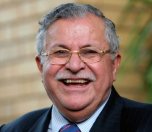Click to read the article in Turkish
Kurdish politician and the former President of Iraq Jalal Talabani lost his life yesterday (October 4) in Germany's capital city of Berlin where he was in treatment.
The news about Talabani's death appeared first on the social media and his death was later confirmed by Kurdsat, Patriotic Union of Kurdistan's (PUK) TV channel.
Already in the recent months, there were rumors about Talabani's death and it had been claimed that it had not been announced officially to the public in order not to disturb the referendum process.
On December 18, 2012 Talabani had suffered a stroke and was in intensive care in Baghdad according to a statement issued on the president's official website said that he was being treated for blocked arteries. He later traveled to Germany for treatment and returned to Iraq in 2014, after more than 18 months of medical treatment. On July 24, 2014, his term of office ended.
Who is Talabani?
Born in 1933, Jalal Talabani was the founder and had been secretary general of one of the main Kurdish political parties, the Patriotic Union of Kurdistan (PUK) since it had been founded in 1975.
He was a prominent member of the Interim Iraq Governing Council, that was established following the overthrow of the Saddam Hussein regime by the invasion of Iraq in 2003. Talabani had been an advocate for Kurdish rights and democracy in Iraq for more than 50 years. Apart from his native Kurdish, Talabani is fluent in Arabic, Persian, and English.
As a Kurdish politician who served as the sixth President of Iraq from 2005 to 2014, as well as the President of the Governing Council of Iraq (39th Prime Minister of Iraq) he was the first non-Arab President of Iraq,
Rights for Kurds
When in September 1961, the Kurdish uprising for the rights of the Kurds in northern Iraq was declared against the Baghdad government of Abdul Karim Qassem, Talabani took charge of the Kirkuk and Silemani battle fronts and organized and led separatist movements in Mawat, Rezan and the Karadagh regions. In March 1962, he led a coordinated offensive that brought about the liberation of the district of Sharbazher from Iraqi government forces. When not engaged in fighting in the early and mid-1960s, Talabani undertook numerous diplomatic missions, representing the Kurdish leadership at meetings in Europe and the Middle East.
The Kurdish separatist movement collapsed in March 1975, after Iran ended their support in exchange for a border agreement with Iraq. This agreement was the 1975 Algiers Agreement, where Iraq gave up claims to the Shatt al-Arab(Arvand Rūd) waterway and Khuzestan, which later became the basis for the Iran–Iraq War. Believing it was time to give a new direction to the Kurdish separatists and to the Kurdish society, Talabani, with a group of Kurdish intellectuals and activists, founded the Kurdish Patriotic Union of Kurdistan (Yekiaiti Nishtimani Kurdistan). In 1976, he began organizing an armed campaign for Kurdish independence inside Iraqi Kurdistan. During the 1980s, Talabani sided with Iran and led a Kurdish struggle from bases inside Iraq until the crackdown against Kurdish separatists from 1987 to 1988.
In 1991, he helped inspire a renewed effort for Kurdish independence. He negotiated a ceasefire with the Iraqi Ba'athist government that saved the lives of many Kurds and worked closely with the United States, United Kingdom, France and other countries to set up the safe haven in Iraqi Kurdistan. In 1992 the Kurdistan Regional Government was founded. Talabani has pursued a negotiated settlement to the internecine problems plaguing the Kurdish movement, as well as the larger issue of Kurdish rights in the current regional context. He works closely with other Kurdish politicians as well as the rest of the Iraqi opposition factions. In close coordination with Masoud Barzani, Talabani and the Kurds played a key role as a partner of the US-led Coalition in the invasion of Iraq. Talabani was a member of the Iraqi Governing Council that negotiated the Transitional Administrative Law (TAL), Iraq's interim constitution. The TAL governed all politics in Iraq and the process of writing and adopting the final constitution.
Presidency
Talabani was elected President of Iraq on April 6, 2005 by the Iraqi National Assembly and sworn into office the following day. On April 22, 2006, Talabani began his second term as President of Iraq, becoming the first President elected under the country's new constitution. His office was part of the Presidency Council of Iraq. Nawshirwan Mustafa was Talabani's deputy until Mustafa resigned in 2006 and formed an opposition party called Gorran.
*Source: PUKMEDIA
(HK/DG)





